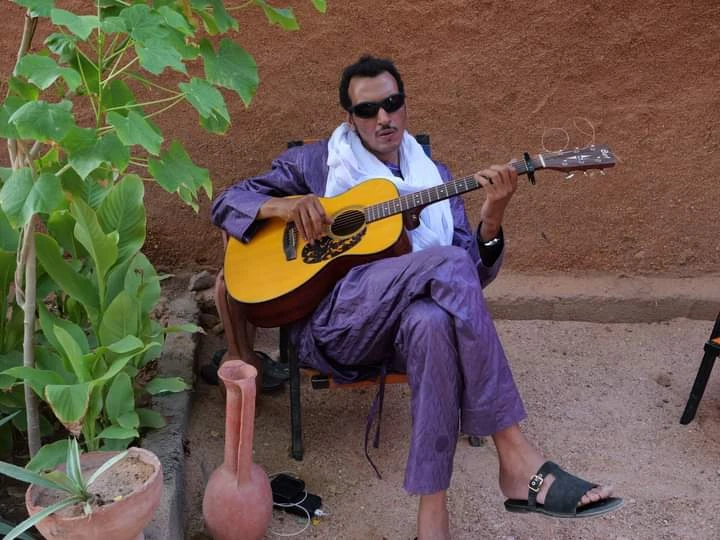Bombino, the Tuareg guitar virtuoso is of humble beginnings. He started as a refugee to becoming a global music sensation, explore his life, music, and impact on the world stage.

Have you ever heard of the Sultan of Shred? He is one of the world’s greatest living blues guitarists and a star among his people, the Tuareg. He is not limited to his musical prowess, but has been a refugee twice because of the crisis between his tribe and the Niger government.
Drawing inspiration from his experience and the Sahara desert, he plays his lead guitar with virtuosity and connects his passion and pain in a relaxed music. He is a record breaker and the first Nigerien to be nominated for a Grammy award.
Inspiration to Pursue a Music Career
Omara "Bombino" Moctar (birth name: Goumour Almoctar) was born in Tidene, Niger, a Tuareg encampment about 80 kilometers northeast of Agadez in the year 1980. He is from the Ifoghas tribe, which is part of the Kel Air Tuareg federation, a nomadic people descended from the Berbers of North Africa.
At the age of 10, he fled along with his family to neighboring Algeria for safety during the Tuareg rebellion in 1990. On numerous occasions, the Tuareg people fought the Niger government to secure their rights. Bombino's journey to music started during exile. They had relatives visiting from the rebellion lines; they left behind a guitar, and he taught himself how to play from it.
The aspiring star eventually learnt to play under renowned Tuareg guitarist Haja Bebe. He asked the lad to join his band, and it was here he acquired the nickname Bombino—an Italian variation word for “little child.” He worked regularly as a musician and also as a herder in the desert near Tripoli, spending many hours alone watching the animals and practicing his guitar. During his exile, he stayed in Algeria and Libya, Bombino’s friends played him videos of Jimi Hendrix and Mark Knopfler, among others, which they watched constantly in an effort to master their tactics.
In his later teenage days in Niger, he was the ‘Hendrix of the Sahel.’ In 2006, he was the chaperone of Angelina Jolie on a six-day journey through northern Niger, accompanied by her camera crew. He said he would play music and she would dance to his tune in the desert. During the second revolt, Tuareg music was considered rebel propaganda. To be labeled one of “les guitaristes” was dangerous, and many of his friends and colleagues were joining the rebellion, but he made the difficult decision to flee again to Burkina Faso.
Filmmaker Ron Wyman sought and tracked Bombino down in 2009. He was enchanted after hearing his cassette with the hope to assist with a proper record. He was in exile in Ouagadougou, Burkina Faso, because two band members were killed in a rebellion. The Spanish documentary film crew helped Bombino record his first album, Group Bombino’s Guitars from Agadez Vol. 2, which became a local radio hit. Bombino was also featured in a documentary. Wyman was filming about the Tuareg. He produced his 2011 solo album, Agadez, alongside. He also returned home in 2010 after the conflict ended, playing at the triumphant concert in front of the Great Mosque in Agadez.
Bombino Musical Style
Bombino’s music showcases captivating vocals, trance-like guitar playing, and evocative rhythms. His music is described as a funky, elegant, gritty mesh of Delta country blues with psychedelic rock. Think of this as Jimi Hendrix meeting John Lee Hooker. NPR music, BBC, and Pitchfork have also praised and commented on his musical style. His sound also displays the electrifying rollicking blues-rock anthem, an acoustic desert campfire singing along, and a lilting bounce that the band has called “Tuareggae.”
As a youth,Bombino was taught the "dry guitar" method of the Tuareg guitar style. Despite his acoustic background, he is a virtuoso on lead guitar. He is a meditative and earthy musician evoking the expansiveness of the Sahara in his work. Bombino does not see his guitar as a gun but rather as a hammer to help build the house of the Tuareg people. No wonder his music is relaxed and the tone of his band music does not carry any metallic rage, emotive shrieks, anarchic angst, desperate pleas; just a sound of hypnotic guitar groove and somber group singing.
Evolution of Bombino’s Music and Themes of Her Songs
Bombino sings in Tamasheq, which is a Tuareg local language. His music albums and lyrics highlight the Tuaregs’ profound connection with the desert, their ancestral home. According to him, the sound and music in the desert, which is a vast open space, carries a power with it. So, with the feelings and an instrument in your hand, you're completing a picture that is incomplete when you play.
Bombino, like many other artists, is working hard to preserve his culture. He tries to create a balance of creative tension between preserving heritage and tradition and innovating it. This includes using local dialect and traditional clothing to preserve the Tuaregs heritage. Being a refugee twice, he wishes for an enduring peace and is concerned about the people he sees on the ‘migrant route.’
Bombino’s Major Achievements
The audience at Brooklyn Bowl is a testament to Bombino’s artistry. Some friends unfurled a flag that represents the Berber-speaking peoples, also known as Amazigh or “free people”. After dancing with it held over their heads, they threw it as a gift to Bombino. A Tuareg fan expressed how they like the guitarist because of the way he expresses their culture to the world, history, bravery, and pride.
Bombino’s most recent albums have all topped the iTunes World Music Chart despite having a smaller demographic of fans in the United States. He had recorded more than three albums in the U.S.A. He also recorded an album “Deran” at Casablanca at a studio owned by the king of Morocco, produced by Mr. Herman.
He earned the taglines as “The World’s Best Guitarist” and “The Sultan of Shred” because of his unparalleled ability to blend sound and soul, solidifying his status as an icon in the world of music. One of his albums “Deran” was nominated in the category of Best World Music Album at the 61st Annual Grammy.
Bombino dreams of launching a musical community center that would provide access to instruments and recording equipment for Tuareg youth. He also tries to show the traditions of his culture in clothing to the United States. The Nigerien is dedicated to advocating for equal rights and education within his community, and he put this passion into his distinctive beat. This makes him the first Nigerien artist to be nominated for a Grammy award.
Conclusion
Tune to Bombino playlist and listen to an artist who can hit perfectly. He was an advocate, a refugee, and a legend of the Tuareg people. His music is fine tuned and earthly and meditative, and his work evokes the expansiveness of the Sahara.

